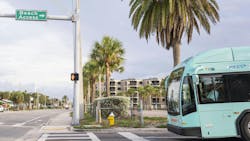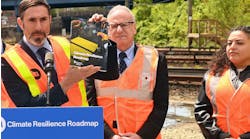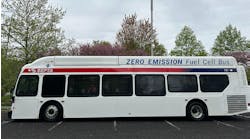ST. PETE BEACH — There were no signs telling attendees where to sit, but as people filled up dozens of folding chairs Monday night in the St. Pete Beach Community Center, they made their divisions literal.
The left side was occupied mostly by those who see recent public transit service as a threat to their way of life — or, at least, to their tax bills and traffic speeds. Congregated on the right were those who support the SunRunner rapid bus line between downtown St. Petersburg and the beach, with its dedicated bus and bike lanes, and a redesign of part of 34th Street in St. Petersburg.
The event, a “transportation town hall” organized by state Rep. Linda Chaney, was nominally a chance to get everyone on the same page. Representatives from the Florida Department of Transportation, the Pinellas Suncoast Transit Authority, and Forward Pinellas, the county’s land-use and transportation planning agency, all showed up to talk about projects such as the SunRunner and 34th Street and how they got approved.
But the meeting’s public comment portion only emphasized the schism between transit critics and boosters.
“The event reminded me of an episode of ‘Seinfeld,’” Vince Cocks, a transit authority board member who watched from the audience Monday, said in a text message Tuesday morning. He was talking about “Festivus,” the one about a holiday centered on the airing of grievances.
Critics said they felt the dedicated bus lane along the SunRunner route has made roads more crowded and dangerous; proponents pointed to studies showing stable travel times and reduced crash rates along the route. Some pointed to the transit authority’s ridership rates, which equate to less than 2% of Pinellas County residents, and said they didn’t want their tax dollars going to a service that they don’t use.
They invoked the failure a decade ago of Greenlight Pinellas, which would have established an extra penny sales tax to build a light rail system between St. Petersburg and Clearwater.
“The people countywide voted against it when it was on the referendum and we had the chance to vote,” said Barb Haselden, who led the opposition against Greenlight.
Others argued that funding a public good, even one used by a minority, is the point of a tax. They noted that the government also subsidizes roads and street parking used only by drivers.
St. Pete Beach, which is part of Chaney’s district, has been a center of opposition to transit measures of late: It was the home of an outcry over homeless riders during the SunRunner’s fare-free first year, and it has birthed much of the opposition to the bus lanes, which do not extend into the city. But much of the talk Monday concerned the 34th Street project, which will add a 2-mile section of bus and turn lanes in addition to widened sidewalks and new crosswalks. It’s well outside St. Pete Beach’s city limits.
“Why are we having this meeting 4 miles away from the corridor we’re talking about?” said Jay James, who serves on the transit authority’s transit riders advisory committee and was on Monday a solitary Black figure in an overwhelmingly white audience. “The community that is directly impacted is not here. South St. Pete is predominantly Black. Where are they?”
There were moments that suggested the two sides could find common ground. They share concerns about accessibility and efficiency: Speakers of both persuasions agreed getting where they want to go takes too long or can involve transferring to other bus routes. People across the board signaled anxieties about how to keep Pinellas safe, and how to keep it feeling like home, amid projected growth of more than 100,000 residents by 2050.
“I think my favorite part about listening to both sides tonight was we’re all kind of circling the drain on the same issues here,” said Franklin Alves of St. Petersburg.
Whether Monday night gave them a way to bridge the gap was unclear. Many of those critical of public transit had arrived early and were among the first to speak — and to leave. By the time the balance shifted, with transit supporters taking the microphone, most of the seats on the left side of the room were already empty.
©2024 Tampa Bay Times. Visit tampabay.com. Distributed by Tribune Content Agency, LLC.



